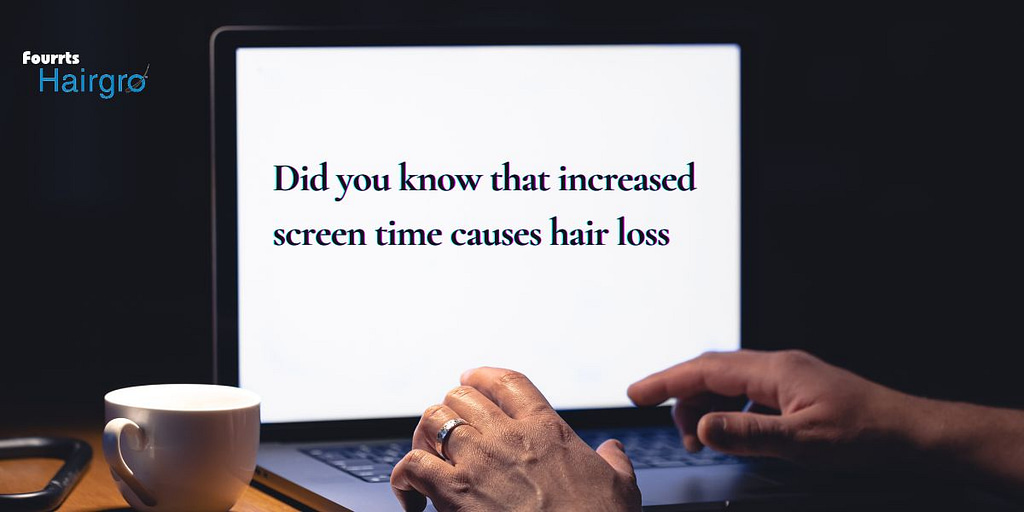In today’s digital age, where screens dominate our daily lives, the effects of blue light and prolonged screen time extend beyond just eye strain and disrupted sleep patterns.
Increasingly, research suggests that excessive exposure to blue light emitted from screens can impact various aspects of our health, including our hair health. Especially those working in tech-centric industries like IT, understanding these effects is crucial for maintaining a full and healthy head of hair.
Blue light is a high-energy, short-wavelength light that is emitted by digital screens, LED lights, and the sun. While exposure to natural blue light during the day can help regulate our sleep-wake cycle and boost mood and alertness, overexposure to artificial blue light from screens can have adverse effects on our health.
How blue light affects your hair
One of the primary ways blue light affects our health is by disrupting our circadian rhythms, the natural internal processes that regulate our sleep-wake cycle.
Prolonged exposure to blue light, especially in the evening and night hours, can suppress the production of melatonin, the hormone responsible for signaling to our bodies that it’s time to sleep. This disruption not only leads to sleep disturbances but can also impact the health of our hair follicles.
Research indicates that blue light exposure can generate reactive oxygen species in the skin, leading to oxidative stress and inflammation. These processes can damage cells, including those in the hair follicles, and contribute to hair thinning and loss over time.
Screen Time and Stress
For men and women working in IT and other tech-related fields, prolonged screen time is often unavoidable. However, the combination of blue light exposure and the inherent stress of these professions create a double whammy effect on hair health.
Increased Cortisol Levels
Extended periods of screen time, coupled with the demands of tech jobs, can elevate cortisol levels in the body. Cortisol, known as the stress hormone, plays a role in the body’s fight-or-flight response but can have detrimental effects when chronically elevated.
High cortisol levels have been linked to hair loss conditions such as telogen effluvium and alopecia areata.
Poor Posture and Scalp Circulation
Sitting in front of a screen for hours on end often leads to poor posture, which can restrict blood flow to the scalp.
Reduced scalp circulation means fewer nutrients and oxygen reach the hair follicles, compromising their health and leading to increased hair shedding and slower hair growth.
While it may be impossible to completely avoid screens in today’s tech-driven world, there are steps you can take to mitigate the adverse effects of blue light and screen time on their hair health. Follow the below things to keep your hair healthy.
Use Blue Light Filters
Invest in blue light filters for your devices or use software applications that adjust the color temperature of your screens to reduce blue light exposure, especially in the evening hours.
Take Regular Breaks
Practice the 20-20-20 rule: every 20 minutes, take a 20-second break and look at something 20 feet away. This helps reduce eye strain and gives your eyes and hair follicles a much-needed break from screen exposure.
Prioritize Stress Management
Incorporate stress-reducing activities into your daily routine, such as exercise, meditation, or spending time outdoors. Managing stress not only benefits your overall health but also supports healthy hair growth.
Maintain Good Posture
Be mindful of your posture while working at your desk. Sit up straight, adjust your workstation ergonomics as needed, and take regular breaks to stretch and move around to improve scalp circulation.
Conclusion
In the digital age, awareness of how blue light and screen time affect your hair health is essential for maintaining a thick, healthy mane. By implementing strategies to reduce blue light exposure, manage stress, and promote scalp circulation, you can safeguard their hair against the detrimental effects of our screen-centric lifestyles.
Remember, a healthy balance between technology and self-care is key to preserving not only your productivity but also your most valuable crown your hair.
Reference:


